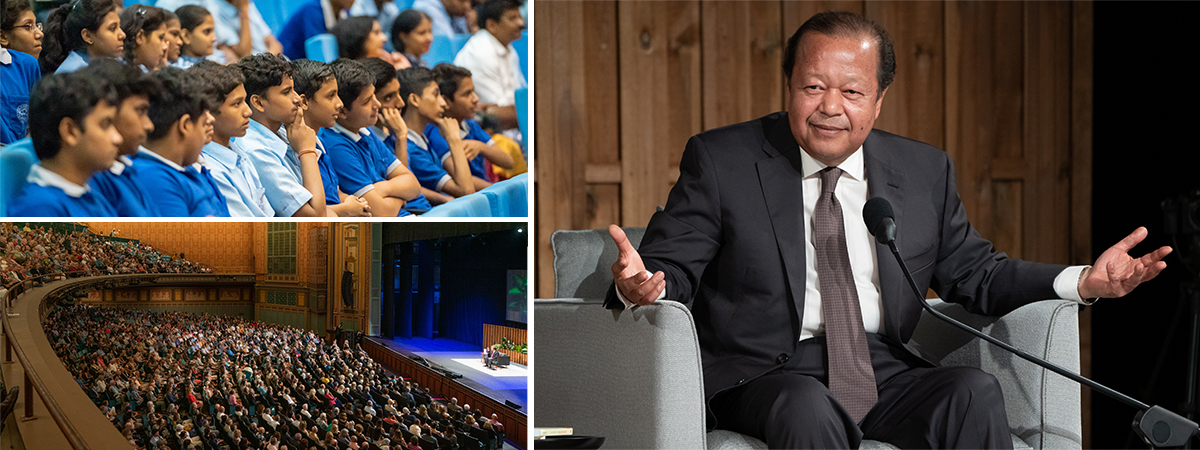Topics
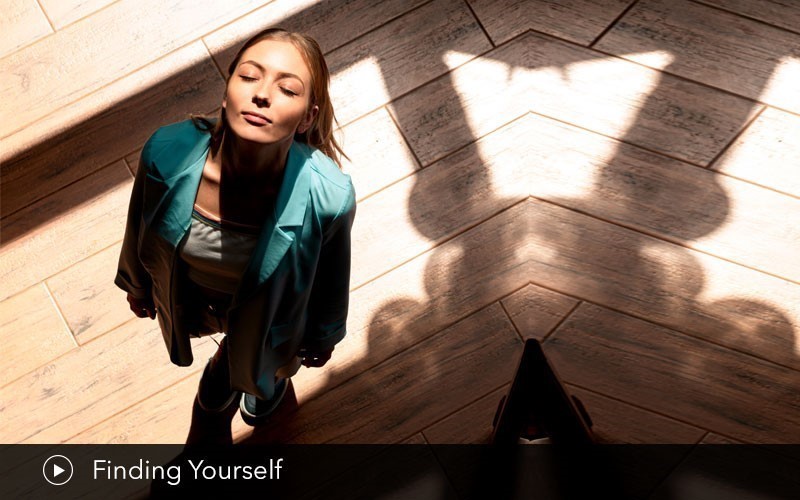 00:05:40
Finding Yourself
Video
Duration : 00:05:40
Be the one. Simply be.
00:05:40
Finding Yourself
Video
Duration : 00:05:40
Be the one. Simply be.
Jessica Zweig:
You are clearly very inspirational, Prem. You literally travel the world and inspire people for a living. I’m interested to know, who inspires you?
Prem Rawat:
Well, I am inspired by everybody that I inspire. And when I see people being inspired by a message, my question always is, "Why? What did I say that is so unique, so incredible?"
And yet I see that all of a sudden, they thought where they were, versus where they now see that they are, that they are not without the tools in their life; they’re not alone; they’re not abandoned; they’re not in these dire straits. They’re actually doing pretty good.
And to acknowledge that in their lives—and a beautiful light comes shining through them. And that’s what inspires me. That’s really what inspires me.
Jessica Zweig:
Yeah, me too. Watching people wake up to their own power and joy is....
Prem Rawat:
Yeah, that, absolutely, it’s the most, most stunning thing to see, to observe.
Jessica Zweig:
Absolutely. I really want, you know, those listening to look at themselves with that ability. It’s such a core central theme of my work. I help people find their message and help them to build their platforms and to create awareness of those platforms, that they can impact more people and impact their careers and impact their lives.
I think a lot of people have self-limiting beliefs that they are worthy of being that person. They’ll look at someone like you—or maybe even me, people who have platforms—and say to themselves, “I, I couldn’t do that. I’m not worthy of doing that; I don’t know how to do that.” What advice do you have for those people?
Prem Rawat:
Let me tell you a little story—and I gave this example. And somebody asked me a question a long time ago. They were actually wondering, you know—they were talking about, “Is this good; is this good; is this good?” And I said, “The value of all these things that you have described to me is zero—and you are a ‘one.’”
So, when they heard that, they were really very angry with me. And in fact, they walked out. Because they were like, “And how could you say what I am talking about has to be zero?”
And I said, “But”—I continued with my analogy, and my analogy was, “Everything you’re talking about is zero—and you are a ‘one.’ Place zero in front of a one and what do you have? One!—and a zero. No value, nothing. Nothing changes.
“Put that zero after a one and it’s a ten; it’s a hundred; it’s a thousand; it’s a hundred thousand; it’s a million; it’s....” All these things, placed after you, after you are worth a lot. Placed before you? And they mean nothing, absolutely nothing. That’s math; that’s math. Yeah, I mean, anybody can do that math.
And to me, that’s the way I see it. You know, it’s just, “First, find yourself; then take all these things that you want to do and put them after you.” And they will be ten, a hundred, thousand, ten thousand, a hundred thousand, a million, ten million, a billion, trillion, whatever.
But keep placing them before you? They mean nothing! Nothing. Absolutely nothing.
Jessica Zweig:
I love that. “Be your own ‘one.’” Be the “one.” Brilliant, brilliant!
Where can people find you, more about you?
Prem Rawat:
Well, I am reachable through PremRawat.com. PremRawat.com, yeah.
Jessica Zweig: [simult.]
It’s a beautiful site. Beautiful.
I have one final question for you, Prem. You’ve given us such beautiful wisdom today. I would love to know—as I ask every guest—what do the words “simply be” mean to you?
Prem Rawat:
To be that “one”—without the zeros in front, with all the zeros after. And now you’ve got everything. Simply be. Simply, simply, simply, simply, simply-simply-simply. Not thinking about this; not getting into—but just simply be.
Look at a child; look at a baby. That baby knows how to simply be. You are still that baby. Well, you were once a baby—and you’re still that baby. That baby never died; that baby never went away.
Tap into that resource that you have to be that baby, and you will simply be. Because simply being is it—is it, is the it.
Jessica Zweig:
I’m crying; I’m smiling; I’m nodding; I’m tearing up at the same time. That was so beautifully stated. Thank you so much for explaining it that way. It touched my heart. And this is something I speak about all the time. And to hear you say it in that way was just really meaningful.
Thank you so, so much for being on my show. It is just such an honor to speak to you and to learn from you. And thank you for the reminder—to simply be. Because I needed it today, especially.
Prem Rawat:
Thank you; thank you so much for letting me be on your show and—great, wonderful; thank you. Thank you.
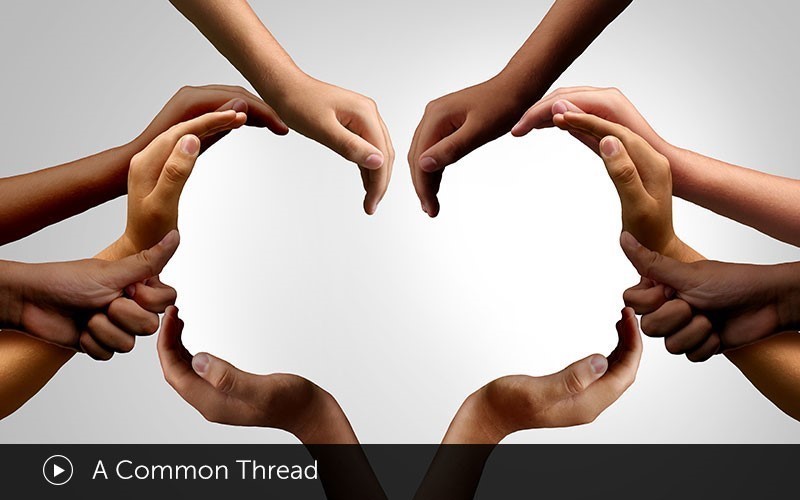 00:11:36
A Common Thread
Video
Duration : 00:11:36
“I want to always bring it home—to ‘we need to know what life itself is,’ not ‘w...
00:11:36
A Common Thread
Video
Duration : 00:11:36
“I want to always bring it home—to ‘we need to know what life itself is,’ not ‘w...
Jessica Zweig:
You have been speaking to audiences since you were four years old, and you’ve been spreading this message of peace for a very long time.
And I think, today, more than ever before—and I wasn’t around fifty years ago—but there is just so much more to consume ourselves with. And I think it’s harder and harder to get in touch with that dreamer. And we don’t give ourselves the permission to do that.
You know, most of us wake up, check our phones, eat breakfast while we’re checking our phones, rush to work on our phones, get to our office and—and are, you know, inundated all day long. And then we come home and by the end of the day, we’re just exhausted.
And there’s—it’s just so hard, especially in modern society in America—in the West, at least, where finding this space to know the dreamer has just become harder. I would imagine, since the time you’ve started your career, you’ve seen so much more happening in the world. And how do we mitigate against that? How do we technically do that?
Prem Rawat:
Well, the thing is, there are problems that have arisen in society. And the problems that have arisen in society are that people are not understanding not only themselves, but they’re not understanding other people.
To me, you know, when people talk about the problems that are happening in.... The fire season is on in California, by the way. And I don’t know if, on the East Coast, they’re listening to the news that, you know, “This part of California’s on fire; that part of California’s on fire.”
And imagine, on one hand, you have California on fire. On the other hand, you have a bunch of refugees who are traveling from their country towards central Europe—and they are in dire straits.
And there is a person in California whose house is in fire and they’re in dire straits. And there is a tornado in the panhandle of Florida that has just demolished this person’s house. And they are emotionally distraught and they’re—everything that they worked for is just, this little tornado came and destroyed it.
Is there a similarity? Is there a similarity between that guy watching his house being burned down, another one in the panhandle who’s just watching his house being disintegrated, and a person who is of a totally different religion, totally different faith, on a boat, taking on the waves and in dire straits because, are they going to make it? And when they make it, are they going to be let in? I mean, they have no choice to go back. It’s a horrible situation.
Then you’ve got all these refugees who are not being allowed, being shoved further and further south of even, you know, Mexico and Honduras and so many other countries, and it’s like, “Go away; go away; go away.” Is there a similarity?
And is there a similarity in all the oceans being riddled with plastic? And is there a problem with the Amazon forests being destroyed, every square inch of them being potentially on the list of being absolutely destroyed?
And I say, “Yes, there is; there is a common thread. And the common thread is the human being. The pain and sorrow that is being caused, is being caused by human beings and is being suffered by human beings.”
And so, human beings are the common denominator in all these problems. And yet, what is the problem with the human being? I mean, isn’t it wonderful that we can do all these things that we have done? I mean, after all, human beings have done some pretty incredible things.
Mind you, we have wiped out a bunch of diseases that existed; we have gone to the moon; I mean, my God, we can communicate; we have done a lot of wonderful things.
But by the same token, have we done something that is wrong? And the answer to that is, “Absolutely!” And we continue to do it, because we don’t see it. We don’t see. What we don’t see, we cannot correct.
And what we don’t see in our lives so much is, “My life is limited. My life on this planet Earth is limited.” I mean, if you were to take.... Even if you were to live a hundred years, how long is that in days? Thirty-six thousand five hundred. Now, thirty-six thousand five hundred is not a very long time at all!
When you think about it—I mean, it’s like, “And wait a minute; maybe, maybe I misplaced a zero, right? Three hundred and sixty-five?” No! It’s actually thirty-six thousand five hundred. And that’s if you get to live for a hundred years—a hundred years.
My God, that’s still, you know—anybody who crosses the hundred-year boundary—at least, in Japan—gets a, you know, recognition from the government.
So, it is still a novelty, and yet it is such a short time on the face of this earth. Well, who are you? What are you all about? Are you about all your problems? Are you the creator of all your problems in your life and that’s it? Or are you something more? Can you offer yourself some help?
And what I’m saying is that “Of course you can—and you are your salvation.” You are your salvation. You don’t need an angel to come down from the heavens to take care of your problems. You are the ones who are going to take care of your problems.
And the way you’re going to do it, it’s by starting to look around; it’s by starting to see—not close your eyes, but by looking around.
Your life, your understanding, every single day, saying, “Who am I? What am I about? What is my relationship with everything that I live in? In my house, my children, my husband, my boyfriend, my person who I work with, what is my relationship with these people?”
And to really bring it home that you are here—and you can make a difference and you’re going to make a difference. But the difference you’re going to make is from the simplest little things in your life. And that’s where you’re going to begin.
Jessica Zweig:
Yes, so true. It’s beautifully said. I’m just so aligned. Because I literally just recorded an episode myself of my show about the power and the responsibility that we all have to impact the world, ourselves—that we actually have the ability to do that.
And, you know, my show is about personal branding and giving people the tools to help them put themselves out on a stage, whatever that stage might be, with a positive message that comes from their hearts.
But what I love about what you’re saying so much, Prem, is that finding peace within yourself isn’t a passive act, actually; it’s a very empowered decision. And that taking true responsibility for yourself is your biggest job.
I can speak to a retreat that I took, a women’s retreat I went on a few years ago, and I was in total victim mentality, thinking that everything was happening to me. It was my husband’s fault; it was my job’s fault; it was the weather’s fault; it was the time of the year’s fault—it was everyone else’s fault but mine.
And I was probably the most depressed I had been in a long time. And in just a matter of a few days in this retreat, I worked with, you know, all of these amazing women coaches who kind of woke me up—that it’s no one’s, no one’s fault but mine to let myself be and feel this way. And that taking total, unapologetic, radical responsibility for your life is the path to peace.
Would you agree with that?
Prem Rawat:
I would like to add something to it. I mean, once you have defined that something is wrong—and then you say, “Okay, I’m going to correct it,” that’s not peace. Peace is much more fundamental than that.
Because these situations—for instance, you know, if your relationship with your husband is really bad and you go, “Okay, if I fix my relationship with my husband, everything will be fine.” But there was a time you weren’t married. And you still needed peace. And how will you get peace if you’re not even married and you can’t fix that problem because you don’t have a husband?
But peace goes beyond that threshold. And peace gets to the very fundamental of life itself. What is life itself? What is your definition of life itself?
When you wake up in the morning, you think about all the things you’re going to do. Do you think about all the things that you have to do—and that one fundamental thing that you have to do, just to breathe? And if you were just to stop breathing, you would be dead?
I mean, do you understand your existence, that you are alive? That this is a gift that you are being given? It has taken the whole universe to collude so that you can be alive today.
That you can be alive today! You were in the making for millions and billions and billions and billions and billions of years. Do you accept that as a gift? Do you even see that as a gift?
Or do you see your problems going away as a gift? Because, if you see your problems going away as a gift, you’re missing on life. You’re not missing on your, you know, what’s happening because you are alive, but you’re missing out on what life itself is.
And I want to always bring it home—to “we need to know what life itself is,” not “what you can accomplish because you are alive.”
There is a driver, and the driver has to pay attention to what the car is doing. There may be other passengers who can roll down their window and say, “Look over there; oh my God, oh my God,” but not that driver. The driver has to enjoy what he can enjoy whilst he is paying one hundred percent attention to his driving.
Because if he starts to lose that focus, an accident is imminent. And that accident that is imminent is the way I see the problems in our lives today. We’re having mini-accidents. Because we are not taking into account what is really, really important. And that thing is paying attention to who we really are.
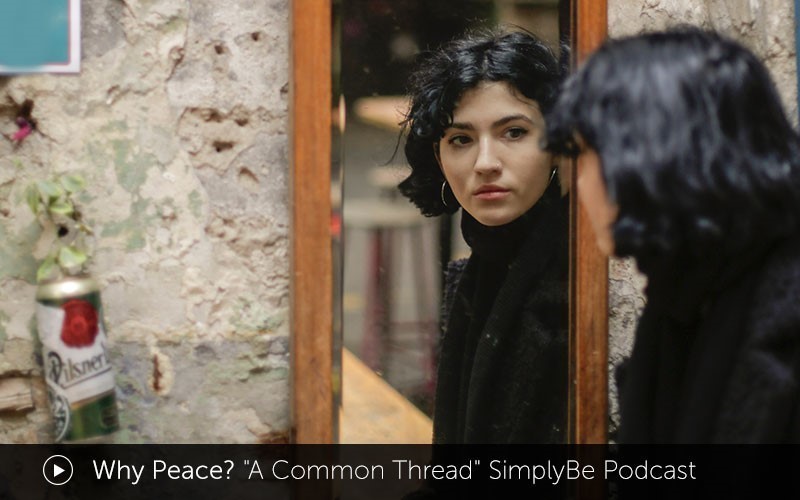 00:08:13
Why Peace?
Video
Duration : 00:08:13
If we understand who we are as a human being, we can understand our limitations,...
00:08:13
Why Peace?
Video
Duration : 00:08:13
If we understand who we are as a human being, we can understand our limitations,...
Jessica Zweig:
I think it’s also gotten a lot more difficult to get in touch with who we truly are because of the sheer noise of life—technology, opportunity. The desire to know oneself is sort of trendy today. And I think that, in and of itself is overwhelming for people.
So, how do you tap in? What would be the first step?
Prem Rawat:
You’re absolutely right! People are so caught up in everything else that they have forgotten who they are. And so our journey must begin with first establishing base with ourselves—not with other things, not with other solutions, but with us, with us, just as an individual, just as who you are.
Continuing onscreen text:
SimplyBe. Podcast
Jessica Zweig, Host of The SimplyBe Podcast.
Interviews Prem Rawat, Author & Global Peace Ambassador
The SimplyBe. Podcast is a collection of conversations about building a business by knowing WHO YOU ARE at your core, and showing up as your true, unapologetic, authentic self.
Jessica interviews thought leaders, CEOs, and some of the most magnetic personal brands of today.
A Common Thread
Jessica Zweig:
Welcome to my show Prem; thank you so much for being with me today.
Prem Rawat:
It’s a great pleasure to be with you and with your audience and to share some insights. I’ve been doing this for quite a long time, and it’s just wonderful to help people all around the world who need help, who want to take some help.
Jessica Zweig:
I could not agree more. And it is; the honor and privilege is mine. I know you have a prolific career, over fifty years traveling the globe, speaking in over 250 cities, probably more, on this topic of peace and the universal desire that we all have for it. And I’d love for you to speak to that—why, why peace, Prem?
Prem Rawat:
Well, but, you know, so much of the education that we receive.... Because everything that we think we know is really something that has been added to us; this is not fundamentally what we knew when we were born.
We knew one thing when we were born, which is, "Give a cry if you need something, and if you are happy, go to sleep." And that’s how our lives actually started. And then it’s like, "Oh, I have to do this; I have to accomplish this; I have to succeed in this." All this was learnt later on.
And what does it mean when we learn all these things? Do we make a separation between these things and who we are? We don't! We think, "This is my idea; this is what I have to do." [Jessica: Umm.] And on we go!
And then, before you know it, we find ourselves in a very complicated situation. And the situation might be that we even have a job that’s bringing home the bread and butter, but we hate it; we hate it. And we hate going to our work every single day.
And there we are, caught in this paradox of “What do I do now?” Because I know that I have to get bread and butter home; maybe there are other people in my household who are relying on me to bring that bread and butter home, but something in me doesn’t want to do it. I don’t enjoy what I’m doing; I don’t enjoy being who I am; I don’t enjoy—"This is too much pressure; this is too much...."
And a lot of people, they go, "Okay, ahh...." All of a sudden one day, they find themselves walking on a road. And they find that a shoe that they’re wearing is full of a very sharp rock.
And instead of taking the time to remove the rock from the shoe and comfortably go on walking, they are like, "Well, give me an aspirin; give me something that’ll take away my pain; give me a band-aid; give me something because this is horrible."
And somebody comes along and says, "Well, you know, why are you taking all this medication? Why are you doing all this? Do you know why you’re doing this, because you don’t have to. All you have to do is take away that rock that’s in your shoe, and you will be comfortable again."
And sometimes it sounds so simple when you say it, but it's so complicated. With all the challenges that we have in our life, we find ourselves nailed against the wall sometimes. And we’re looking for a solution out of this misery. And yet it's just like, the more solutions we look to, the more complex those solutions are.
You know, it’s like, "Okay, sit down in a room—and don’t think about anything." And it’s like, "Control your thoughts."
And I remember, when I first came—I was a teenager when I first came to America; I was thirteen years old. And people much older than me and much more educated than me would sit down and go, "Okay, how do I control my thoughts?"
I said, "Well, why do you want to control your thoughts? I mean, what do you think you’re going to gain by controlling your thoughts? Don’t you understand that the desire to control your thought is a thought in itself?" [Jessica: Right.]
You’re still attached to the thought, and you’re going to be sitting there in some room, going, "Am I controlling my thoughts? Have I controlled my thoughts? Have my thoughts gone away?" And you’re going to be thinking about your thoughts going away. And so, how have you become thoughtless? You’re not thoughtless; you're still thinking.
And that just goes to the quintessential essence of it. Because we need to understand who we are as a human being. And if we understand who we are as a human being, we can understand our limitations, and we can also understand our strengths.
And this is what we don't know; we don’t know our strengths, but we finally have learnt our limitations. [Jessica: Yeah.] And the world is frustrated because of that.
Jessica Zweig:
Right. Well, I think it's also gotten a lot more difficult to get in touch with who we truly are because of the sheer noise of life—technology, opportunity. The desire to know oneself is sort of trendy today. And there are all of these different ways in which we can explore that. And I think that, in and of itself is overwhelming for people.
So, how do you tap in? What would be the first step? Because I agree with you; it's really, really simple—but it's still so hard for people.
Prem Rawat:
Yeah. And you know, it's like, in a way, exactly what you said and it's very true. But at the same time, it's like, "Well, I can't smell myself. I can smell the flowers and I can smell the bees and I can smell everything else, but I can't smell me."
And it's like, "Well, but excuse me. You don't know who you are? I mean, you are in you—and you are attached to you. And yet you are so alienated from you. How can that be?" Wait, what's going on here? What mirror are you looking at? Who are you looking at, if you cannot find yourself amidst this huge ocean?
And yet you are absolutely right. People are so caught up in everything else that they have forgotten who they are. And so, our journey must begin with first, establishing base with ourselves. Not with other things, not with other solutions, but with us, with us, just as an individual, just as who you are. Not how you should be—but who you are. [Jessica: Right.]
And begin with that—and that is the very first step.
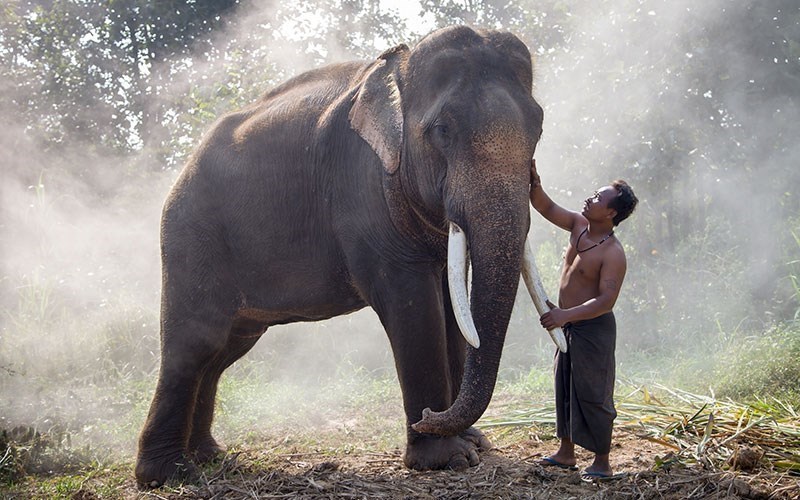 00:07:24
Strong of Heart
Audio
Duration : 00:07:24
Everything that happens in this world is the reflection of a human being.
00:07:24
Strong of Heart
Audio
Duration : 00:07:24
Everything that happens in this world is the reflection of a human being.
Wherever I go and I start talking about the subject of peace, most people wonder and ask me, “What about all these problems that we have? Why don’t we have peace? What happened?”
So I would like to tell you a story. There was a man and he had heard about elephants—that elephants were big; they were huge; they were powerful and they were mighty; they could lift a whole tree with their trunk. He wanted to see an elephant.
So he did some research; somebody told him, “You want to see an elephant, go to India!” So he found the village which is very famous, very popular for elephants, and he went there. And when he arrived at the village, he saw all these magnificent elephants standing there. And each one of the elephants had a very thin little rope tied to the leg, just very thin—and they were standing.
And the man was really surprised. He had never seen an elephant before, and he was very impressed by the power of the elephant. But he was also very confused. So he went to the village chief, and he said, “Chief, I have a question!”
He said, “This is the first time I’ve seen these elephants, and they’re strong, they’re mighty, they’re powerful. But you are tying them up by this little rope that is so fragile. Why don’t these elephants just run away? Why are they standing there? It’s not the rope that’s holding them, because they could easily break that.”
And the chief said, “Oh, that. Let me explain to you. When these elephants were really young, we tied them with these little ropes. Then they were not so strong, and the rope was enough to hold them. Now, they are definitely strong enough to break the rope, but they have forgotten their strength, and this little rope is enough to hold them.”
In a way, that is so sad. But that is our story too. That is our story too. We have forgotten our strength. We forget who we are. We forget the compassion in us. We forget the passion in us. We forget the kindness in us. We forget the joy in us. We forget what is a human being.
You cannot talk about peace without talking about the human being, because it is in the heart of that human being that the peace dances.
Right now, I know people say, “Oh, people are terrible. Look what they’re doing! They’re killing each other, terrorizing each other, putting fear in each other.” That’s not the nature of a human being.
There is a lot of good in this world; there is a lot of kindness in this world. There is a lot of generosity in this world. And this is the true nature of a human being; this is your true nature. To adore—to adore peace! To want peace. To be fulfilled! Need I say it? Indeed, to create a heaven right here on the face of this earth.
People talk about, when they die, will they go to heaven? There’s a small problem with that beautiful heaven. You have to die to get there. Why not create an experience, the heaven, whilst you’re alive? Whilst you are alive, whilst you are here?
People say, “Oh, look how many people go hungry.” Why? Have you ever thought of why people go hungry? Is it because there is shortage of food? No! Forty percent of the food that is actually farmed goes to waste. It’s thrown away. It’s unfit for consumption. There is more than plenty of food to feed everybody.
People say, “People don’t have clean water!” There’s plenty of water—believe me, there’s plenty of water. And who makes the water unclean? We do.
It’s up to us to understand our true nature, our power—that if we want the peace, we can have peace. We don’t have to be held back by a little rope of the elephant.
– Prem Rawat
 00:02:39
A Pill for Peace
Audio
Duration : 00:02:39
Those people who are happier, and in peace with themselves, heal much faster tha...
00:02:39
A Pill for Peace
Audio
Duration : 00:02:39
Those people who are happier, and in peace with themselves, heal much faster tha...
A few days ago I was wondering what I’m going to be saying at this forum ... Medicine for Peace—I mean that’s a nice headline. But, is there really a pill for peace? Because that would be nice if there was a pill for peace. You just take it, and you have peace!
So I started thinking, “Is there a pill for peace?” And all of a sudden, I realized that there was. There actually is a pill for peace. Now I know you’re sitting there going, “What? We’re doctors. We have never come across a pill for peace. That would be too good! We could just hand you the pill—and we could take a whole bunch, right, as doctors.”
Well, that would be great. But there is a pill. And what is it?
Well, it’s called consciousness. And to tell you about it more, I will quote Dariya Maharaj. “[Hindi: दरिया सोया सकल जग, Everybody’s asleep. जागत नहीं है कोय। जागे मे फिर जागना, जागा कहिये सोय।]. (Only those who are awake, and awakened whilst awake, are truly the only ones who are awake.) That’s the pill for peace. To be awakened.
And I’ll tell you. I don’t know if there’s a scientific study been done or not. But those people who are happier, who are in peace with themselves, heal much faster than those who are worried sick. But that should tell you something.
And then—what do we do all day long? We worry! We—I mean, I’m sure, so many doctors, you know that when the patient is happy and cheerful, he will heal faster. And what do you start your day with? Worrying. The very thing you know can make you sick! Because we are not awake. We’re not awake, and that’s what it means, to be awake—in being awake. It’s so important.
- Prem Rawat
 00:06:33
The Challenge That We Face
Audio
Duration : 00:06:33
The greatest challenge of all? Understanding human potential.
00:06:33
The Challenge That We Face
Audio
Duration : 00:06:33
The greatest challenge of all? Understanding human potential.
The challenge that faces us is a very different one, my friends, than we generally accept or understand. It is not about rich countries; it is not about good economics! It’s not!
Our effectiveness lies in not, solutions to our problems, but doing the right thing—and the right thing is peace. Not on earth! Because that sounds so good, right? “Peace on earth”—I mean, I’m, I’m called the “Peace Ambassador,” so I shouldn’t, I should not be saying, “No. Not peace on earth.” I should be saying, “Oh yeah, peace on earth, peace on earth. Peace, peace, peace on earth, peace on earth, peace on earth,” right?
I’ve traveled the earth. And I have found only one thing that is making no peace on earth. And you know what that is? That is the human being. If there is no peace on this earth, it’s not because of the crows; it’s not because of the alligators; it’s not because of anything else but human beings.
They are the ones polluting... "What about hunger?” People ask me this. “What about hunger?” And what about hunger? Do you think there’s a shortage of food? Forty percent of the food that is grown is wasted!
Because it is our shortfall in our own understanding... It is the shortfall in our own understanding; it is the shortfall of us not understanding our potential that we have!
Do you know...? Then, the example I’m about to give is for everyone sitting here. Do you know that once upon a time, you did something—all of you have done this. And this one act that you did require phenomenal courage, incredible drive, and hundreds of failures.
You know what I’m talking about, right? Walking—when you learned how to walk. Your legs were not strong enough to let you walk. Your muscles had to be strengthened—and you were going to do it.
Oh, by the way, how many books did you read on the subject of walking? None! How many classes did you attend? [Ind.: None.] None! How many tutorials did you get? None! There you were, all by yourself, learning to walk. you failed—but you never accepted failure. That was the only difference. Now when you fail, you accept failure. You got up and you fell! And you failed! Right? You failed!
What is the difference between then and now? Only one. Because you still get challenges like that. But there is one difference. Then, you failed but you never accepted failure.
That’s the only difference. The challenges that you face. They require phenomenal courage; they require phenomenal strength! You may not even have the tools with you! But you fail, and you accept the failure.
Same thing with peace! Same thing with peace! Peace is not a one-day event. Peace has to be nurtured every day. Every day, there has to be an introspection! Every day there has to be learning; every day there has to be growth—and every day there has to be understanding. And every day, the courage has to be exercised.
To be motivated, not by me or someone else—but to be motivated by you to move forward. To find your strength, not your weakness! To understand your self—you! Don’t you, don’t you remember what Socrates said? “Know thy self.” Know you! Do you know you? Do you make an investment in knowing the self? Or is it all about, “I want to know my friend; I want to know this; I want to know that”—but not the self.
So, is peace crucial to our societies, to our countries, to our existence, to our civilization? Unquestionably!
It is 7.5 billion people just like you and me that constitute the population of this earth. And if something has to change, the change has to happen from and to the individual.
You know, we have tried everything. We have tried so many things, over the past centuries—but one thing that has never been tried is peace on an individual level. I propose... You don’t have to be Sherlock Holmes to play detective here. I propose—everything else has been tried—this is the only one remaining... Well, let’s try this one. What have we got to lose? Nothing.
- Prem Rawat




